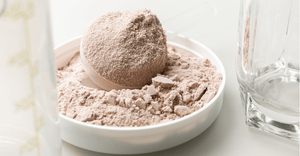L-Glutamine For Gut Health: Step By Step Guide On How To Use
L-glutamine, a potent amino acid, is known for its crucial contribution to enhancing gastrointestinal health. (1) For those experiencing digestive problems, this supplement could offer the necessary assistance to reestablish their well-being.
As our bodies cannot naturally synthesize sufficient quantities of L-glutamine - particularly during periods with high requirements such as pregnancy and breastfeeding - it's essential that we incorporate it through dietary intake. (2)
Extensive studies have demonstrated that incorporating this distinct amino acid into your regimen can yield numerous advantages for gut health, such as reducing inflammation, restoring the health of the gut lining, and promoting proper microbial balance of the intestinal flora. (3),(4),(5)
Delving deeper into how precisely L-glutamine augments digestion will inform individuals about whether this supplement suits their unique circumstances.
Continue reading as we explore the benefits of L-glutamine on gut health, how to take the supplement, and which product stands out as the top L-glutamine powder on the market.
How L-Glutamine Benefits Gut Health
L-glutamine is a powerhouse supplement that supports gut health in four main ways: supporting digestion, reducing inflammation, healing the gut lining, and balancing the gut microbiome.
These four interconnected effects work synergistically to improve overall gastrointestinal well-being. This article will delve deeper into these health advantages while examining supporting research.
1. Supporting Digestion
One primary advantage of L-glutamine is its critical contribution to facilitating proper digestion. As one of the most abundant amino acids present in our body's composition, L-glutamine effectively fuels numerous functions performed by enterocytes—the cells that line our gastrointestinal tract. (6)
These cells are the key players in digestion and are responsible for the secretion of digestive fluids and absorption of essential nutrients. (6)
In turn, supplementing with this essential cellular fuel can support the proper function of enterocytes, promoting optimal digestion. Improving digestion can reduce common gastrointestinal complaints such as indigestion, bloating, and diarrhea.
2. Reducing Inflammation
Inflammation in the gut has been linked to various digestive issues, such as bloating, gas, and diarrhea. (7) Research has tied chronic inflammation in the gut to the development of certain gastrointestinal disorders such as irritable bowel syndrome, Crohn’s disease, and ulcerative colitis. (8),(9),(10)
L-glutamine demonstrates anti-inflammatory attributes that can aid in mitigating gut inflammation, dispelling digestion-related issues, and potentially lowering the likelihood of developing inflammatory bowel disorders.
A 2020 study on the effects of L-glutamine supplementation on animals with ulcerative colitis demonstrated that it prevented intestinal inflammation and improved oxidative stress levels, which can alter gastrointestinal motility. (11)
Reducing inflammation with L-glutamine can lead to a drastic improvement in gastrointestinal function, leading to a reduction in digestive complaints and improved health.
The reduction of inflammation through L-glutamine supplementation can lead to significant enhancements in gastrointestinal function, leading to a reduction in digestive complaints and bolstered health status.
3. Healing the Gut Lining
Extensive studies have established that factors such as unhealthy eating habits, stress, and specific medications like proton pump inhibitors (PPIs) and non-steroidal anti-inflammatory drugs (NSAIDs) can impair the gastrointestinal tract's lining. (4),(12).
This damage may result in a condition commonly known as "leaky gut," characterized by a compromised intestinal barrier that allows harmful substances to pass freely into the bloodstream.
L-glutamine plays an instrumental role in restoring the damaged gut lining. Research has demonstrated it can increase gut cell growth, replenishing the intestinal barrier. (4) As the cells of the intestinal lining replenish, fewer toxins and bacteria can cross into the bloodstream, supporting overall health.
Additionally, research findings suggest that L-glutamine supplementation prevents damage to the gut lining and preserves the structure of the gut wall. (13)
Preventing damage is particularly important for patients who may be undergoing chemotherapy, which can damage cells and lead to gastrointestinal side effects. (14) Supplementation with L-glutamine may reduce these complications and prevent cell damage.
4. Balancing Gut Microbiome
The gut microbiome balances good and bad bacteria in the gastrointestinal tract that significantly influence immunity and overall health. (15)
Research has demonstrated that L-glutamine supplementation may alter the gut microbiome positively by increasing beneficial bacteria and eliminating harmful ones. (5)
Supplementation may also support the gut microbiome through the increased secretion of specialized immunoglobulins, part of the immune system that helps fight off infections in the intestinal tract. (5)
Reducing the risk of harmful infections can help support a healthy gut microbiome with an appropriate balance of beneficial bacteria.
How To Take L-Glutamine For Gut Health
Now that we have covered all of the fantastic benefits of L-glutamine supplementation on gut health, it's crucial to understand how to supplement with this amino acid effectively.
Following these steps will make the most of your L-glutamine supplementation and see the best results.
Step 1: Timing
The first and most important thing to consider when supplementing with L-glutamine is timing. Timing is crucial for proper absorption. Taking L-glutamine on an empty stomach is generally recommended, as high-protein foods can interfere with its absorption. The amino acids in protein-rich foods may compete with L-glutamine for uptake in the intestines.
Because most meals contain some form of protein, it is best to take this supplement an hour before or after a meal for optimal results.
Fortunately, the time of day for supplementation does not impact its effectiveness. Feel free to decide if morning, afternoon, or evening would be the easiest to remember to stay on a consistent schedule.
Some individuals may benefit from taking L-glutamine twice daily to provide consistent gut support. If this sounds like you, try to split the recommended dosage into a morning and evening dose. For many, this may look like taking L-glutamine immediately after waking and before bedtime.
Step 2: Dosage
The appropriate L-glutamine dosage can vary based on individual needs and health conditions. According to a 2008 study, the typical daily intake of L-glutamine from dietary sources is 3 to 6 grams daily. (16)
However, this amount may fall short for individuals looking to restore gut health and those with gastrointestinal diseases that can cause absorption issues, such as inflammatory bowel disease.
Based on research and expert opinions, the recommended dosage is 5 grams to 10 grams per day. (19)
This amount is ideal because it provides optimal amounts of L-glutamine to support your gut, but not too much, which may cause problems associated with tolerance of the supplement.
It's also important to know that this dosage is safe and should not cause adverse effects. Research has demonstrated that healthy adults can ingest approximately 20-30 grams of L-glutamine without side effects. (16) Other research has found that 40 grams daily is the maximum tolerated dosage. (17)
The FDA has even approved L-glutamine for treating short bowel syndrome and sickle cell disease at 30 grams daily. (18) Before starting any supplement, it is best to consult with a healthcare professional or registered dietician to assess the optimal dosage for your unique needs.
Step 3: Consumption
Consumption of L-glutamine is generally safe and easy due to its various formulations. It comes in powder and capsule form, which are both equally effective.
So, which form is right for me? Well, weighing a few factors when determining how to consume L-glutamine is important.
The benefit of the powder form is it can be easily dissolved in many liquids. It also allows for more flexible dosing as you can measure each serving yourself rather than taking a predetermined capsule dosage.
Capsules are easy and convenient but do not allow such easy dosage flexibility. Most capsules will only have about 500mg per capsule, meaning you'll have to take a lot of capsules if you want to hit the recommended dose of 5 to 10 grams.
That's why powdered L-Glutamine is the more common form of supplementation for this reason. It's also a better value compared to capsules.
So, what liquids are best to mix L-glutamine with?
It is best to have L-glutamine in cold or room-temperature drinks such as water, juices, or smoothies. That's because research into the stability of amino acids at varying temperatures has demonstrated that most amino acids, including L-glutamine, are only stable up to 120 degrees F. (20)
Heat can damage the amino acids when L-glutamine is exposed to high temperatures, rendering them ineffective. Don't add it to a hot beverage like coffee, tea, or even bone broth and soup, as it can damage the supplement, making it ineffective.
The Best L-Glutamine Powder For Gut Health
When searching for the best L-Glutamine powder for gut health, assessing the supplement's quality, safety, and purity is crucial. You'll want to get your hands on a reputable brand that offers L-glutamine without additives, fillers, or preservatives.
Our Huge Elements' L-Glutamine powder is one of the best L-Glutamine powders for gut health. This product contains 5000mg of pure L-Glutamine per serving, with each container holding 60 servings.
It has no additives, so you can rest assured it is a safe addition to your gut health routine. It is also very reasonably priced at an affordable $19.95 per container.
That works out to roughly $0,33 per serving to support your gut health - not a bad deal, right?
Frequently Asked Questions
Should I take L-Glutamine powder or capsules?
When deciding between powder or capsules, it is essential to determine your starting dosage and if you plan on increasing L-glutamine. Although both capsules and the powder are equally effective, the powder form allows for more flexibility in dosing.
Powder also requires you to mix the supplement with a beverage like water or juice. Capsules are a specific set dosage but are easy to consume and convenient for busy individuals.
How long can I take L-Glutamine for?
The duration for which you consume L-glutamine is contingent upon your particular requirements and health status. For the majority of people, alterations in intestinal health can be observed following approximately four months of consistent daily dosage.
However, those with significant gastrointestinal damage may require a year or even more to witness optimal improvements. It's crucial to consult about using L-glutamine supplements with your healthcare professional as they will assist you in determining the best treatment period based on your specific needs.
Is it safe to take L-Glutamine?
The use of L-glutamine is generally considered safe for most individuals when administered under the guidance of a healthcare professional at the recommended dosage. (16) Before starting L-glutamine supplementation, discussing your medical background, dietary needs, and health goals with your doctor is essential.
They can assess your unique dietary requirements and determine if supplementation suits you. For the best results, follow the recommended dosage guidelines and stop taking the supplement if you experience any side effects.
How long does it take for L-Glutamine to work?
The time it takes for L-glutamine to work can vary from person to person. The timeline for measurable improvements is based on individual factors and underlying health conditions, which may require extended periods to recover through the introduction of L-glutamine supplementation.
Some people may see rapid improvement in gut health, while others may take months to notice substantial improvement. It is essential to be consistent with supplementation and follow the recommended dosage to see optimal gut health changes.
What does L-Glutamine taste like?
L-glutamine is an odorless powder that is usually tasteless. Some users have reported a slightly sweet, salty, or bitter flavor depending upon the supplement brand. Mixing it with other beverages should not drastically alter the taste of your favorite drinks. It can easily be combined with most room-temperature drinks without changing the flavor, making it simple to consume for anyone.
Conclusion
L-Glutamine is a crucial powerhouse supplement for promoting and maintaining gut health. It can support effective digestion, reduce inflammation, replenish the gut lining, and balance the gut microbiome, making it essential for maintaining and restoring digestive function.
By adhering to the recommended timing, dosage, and consumption, you can ensure that you are getting the most out of your L-glutamine supplementation and doing so safely. When choosing an L-glutamine supplement, opt for a high-quality powder such as our Huge Elements' Glutamine Powder to attain optimal results.
As with any dietary or supplement changes, it is essential to consult with a healthcare professional to determine the best approach for incorporating this product into your healthcare routine. By staying consistent with L-glutamine supplementation, you can expect significant improvements in your gut and overall well-being.
References
- Kim MH, Kim H. The Roles of Glutamine in the Intestine and Its Implication in Intestinal Diseases. International Journal of Molecular Sciences. 2017;18(5):1051. https://www.ncbi.nlm.nih.gov/pmc/articles/PMC5454963/
- Watford M. Glutamine and glutamate: Nonessential or Essential Amino acids? Animal Nutrition. 2015;1(3):119-122. https://pubmed.ncbi.nlm.nih.gov/29767158/
- Wischmeyer PE. Clinical Applications of l-Glutamine: Past, Present, and Future. Nutrition in Clinical Practice. 2003;18(5):377-385. https://aspenjournals.onlinelibrary.wiley.com/doi/abs/10.1177/0115426503018005377
- Krishna Rao R. Role of Glutamine in Protection of Intestinal Epithelial Tight Junctions. Journal of Epithelial Biology and Pharmacology. 2012;5(1):47-54. https://pubmed.ncbi.nlm.nih.gov/25810794/
- Perna S, Alalwan TA, Alaali Z, et al. The Role of Glutamine in the Complex Interaction between Gut Microbiota and Health: A Narrative Review. International Journal of Molecular Sciences. 2019;20(20):5232. https://www.mdpi.com/1422-0067/20/20/5232
- Chen Y, Segner HE, Zhou X, Liu Y. Enterocyte - an Overview | ScienceDirect Topics. www.sciencedirect.com. https://www.sciencedirect.com/topics/agricultural-and-biological-sciences/enterocyte
- Mylene Vivinus-Nébot, G Frin-Mathy, Hanene Bzioueche, et al. Functional Bowel Symptoms in Quiescent Inflammatory Bowel diseases: Role of Epithelial Barrier Disruption and low-grade Inflammation. BMJ. 2013;63(5):744-752. https://pubmed.ncbi.nlm.nih.gov/23878165/
- Choghakhori R, Abbasnezhad A, Hasanvand A, Amani R. Inflammatory Cytokines and Oxidative Stress Biomarkers in Irritable Bowel syndrome: Association with Digestive Symptoms and Quality of Life. Cytokine. 2017;93:34-43. https://pubmed.ncbi.nlm.nih.gov/28506572/
- Roda G, Chien Ng S, Kotze PG, et al. Crohn’s disease. Nature Reviews Disease Primers. 2020;6(1):1-19. https://www.nature.com/articles/s41572-020-0156-2
- Ungaro R, Mehandru S, Allen PB, Peyrin-Biroulet L, Colombel JF. Ulcerative Colitis. The Lancet. 2017;389(10080):1756-1770. https://pubmed.ncbi.nlm.nih.gov/27914657/
- de Oliveira Santos R, da Silva Cardoso G, da Costa Lima L, et al. L-Glutamine and Physical Exercise Prevent Intestinal Inflammation and Oxidative Stress without Improving Gastric Dysmotility in Rats with Ulcerative Colitis. Inflammation. 2020;44(2):617-632. https://pubmed.ncbi.nlm.nih.gov/33128666/
- König J, Wells J, Cani PD, et al. Human Intestinal Barrier Function in Health and Disease. Clinical and Translational Gastroenterology. 2016;7(10):e196. https://pubmed.ncbi.nlm.nih.gov/27763627/
- van der Hulst RRWJ, von Meyenfeldt MF, Deutz NEP, et al. Glutamine and the Preservation of Gut Integrity. The Lancet. 1993;341(8857):1363-1365.https://www.thelancet.com/journals/lancet/article/PII0140-6736(93)90939-E/fulltext
- Pandey M, Goel R, Gaurav K, Shukla M. Glutamine: a Novel Approach to chemotherapy-induced Toxicity. Indian Journal of Medical and Paediatric Oncology. 2012;33(1):13. https://pubmed.ncbi.nlm.nih.gov/22754203/
- Hills RD, Pontefract BA, Mishcon HR, Black CA, Sutton SC, Theberge CR. Gut Microbiome: Profound Implications for Diet and Disease. Nutrients. 2019;11(7):1613. https://www.mdpi.com/2072-6643/11/7/1613
- Gleeson M. Dosing and Efficacy of Glutamine Supplementation in Human Exercise and Sport Training. The Journal of Nutrition. 2008;138(10):2045S2049S. https://pubmed.ncbi.nlm.nih.gov/18806122/
- Holecek M. Side Effects of Long-Term Glutamine Supplementation. Journal of Parenteral and Enteral Nutrition. 2012;37(5):607-616. https://aspenjournals.onlinelibrary.wiley.com/doi/abs/10.1177/0148607112460682
- Glutamine (Oral Route) Proper Use - Mayo Clinic. www.mayoclinic.org. Published February 1, 2023. Accessed January 31, 2023. https://www.mayoclinic.org/drugs-supplements/glutamine-oral-route/proper-use/drg-20064099
- Woznik P. Glutamine Research Analysis. examinecom. Published online July 22, 2023. Accessed September 29, 2023. https://examine.com/supplements/glutamine/#dosage-information
- Weder JK, Sohns S. Model Studies on the Heating of Food proteins. Amino Acid Composition of lysozyme, Ribonuclease and Insulin after Dry Heating. Zeitschrift Fur Lebensmittel-Untersuchung Und -Forschung. 1983;176(6):421-425. https://link.springer.com/article/10.1007/BF01042554













Leave a comment